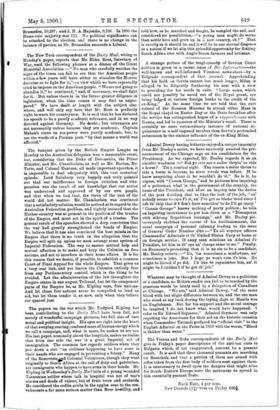Admiral Dewey having hitherto enjoyed a unique immunity from Mr.
Dooley's satire, we have anxiously awaited the pro- nouncement of the Chicago sage on his candidature for the Presidency. As we expected, Mr. Dooley regards it as an amiable weakness :—" Did ye iver see a sailor thryin' to ride a horse ? 'Tis a comical sight. The reason a sailor thries to ride a horse is because he niver r-rode wan befure. If he knew annything about it he wouldn't do it." So is it, he argues, with "Cousin George," and he pictures him inquiring of a policeman what is the government of the country, the name of the President, and after an inquiry into the duties of the post deciding that he likes the look of the job, "an' nobody seems to care f'r it, an' I've got so blame tired since I left th' ship that if I don't have somethin' to do I'll go crazy.'' "Cousin George" knows nothing of party politics ; he tells an inquiring interviewer to put him down as a " Dimmycrat with sthrong Republican leanings," and Mr. Dooley pic- turesquely sketches the course of his disillusionment, the usual campaign of personal calumny leading to the issue of General Order Number One :—" To all superior officers Commandin' Admirals iv th' United States Navy at home or on foreign service : If anny man mintions an Admiral f'r Prisidint, hit him in th' eye an' charge same to me." Finally, on Hennessy's protesting that it is no sin to be a candidate, Mr. Dooley retorts :—" No, 'tis sometimes a. misfortune, an' sometimes a joke. But 1 hope ye won't vote f'r him. He might be ilicted if ye did. I'd like to raymimber him, an' it might be I cudden't if he got th' job."






































 Previous page
Previous page